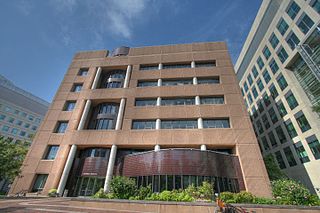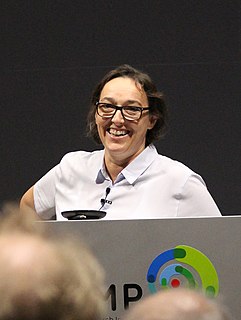Related Research Articles

David Baltimore is an American biologist, university administrator, and 1975 Nobel laureate in Physiology or Medicine. He is currently President Emeritus and Distinguished Professor of Biology at the California Institute of Technology (Caltech), where he served as president from 1997 to 2006. He also served as the director of the Joint Center for Translational Medicine, which joined Caltech and UCLA in a program to translate basic scientific discoveries into clinical realities. He also formerly served as president of Rockefeller University from 1990 to 1991, founder and Director of the Whitehead Institute of Biomedical Research from 1982 to 1990, and was president of the American Association for the Advancement of Science in 2007.

Whitehead Institute for Biomedical Research is a non-profit research institute located in Cambridge, Massachusetts, United States that is dedicated to improving human health through basic biomedical research. It was founded as a fiscally independent entity from the Massachusetts Institute of Technology (MIT), where its 18 members all hold faculty appointments in the MIT Department of Biology or the MIT Department of Bioengineering. Two members are National Medal of Science recipients; ten have been elected to the National Academy of Sciences; and four have been elected to the National Academy of Medicine; six are Howard Hughes Medical Institute Investigators.
The Dickey–Wicker Amendment is the name of an appropriation bill rider attached to a bill passed by United States Congress in 1995, and signed by former President Bill Clinton, which prohibits the Department of Health and Human Services (HHS) from using appropriated funds for the creation of human embryos for research purposes or for research in which human embryos are destroyed. HHS funding includes the funding for the National Institutes of Health (NIH). Technically the Dickey Amendment is a "rider" to other legislation, which amends the original legislation. The rider receives its name from the name of the Congressman that originally introduced the amendment, Representative Jay Dickey. The Dickey amendment language has been added to each of the Labor, HHS, and Education appropriations acts for fiscal years 1997 through 2009. The original rider can be found in Section 128 of P.L. 104-99 . The wording of the rider is generally the same year after year. For fiscal year 2009, the wording in Division F, Section 509 of the Omnibus Appropriations Act, 2009, prohibits HHS, including NIH, from using fiscal year 2009 appropriated funds as follows:

The Eli and Edythe L. Broad Institute of MIT and Harvard, often referred to as the Broad Institute, is a biomedical and genomic research center located in Cambridge, Massachusetts, United States. The institute is independently governed and supported as a 501(c)(3) nonprofit research organization under the name Broad Institute Inc., and is partners with Massachusetts Institute of Technology, Harvard University, and the five Harvard teaching hospitals.
The stem cell controversy is the consideration of the ethics of research involving the development and use of human embryos. Most commonly, this controversy focuses on embryonic stem cells. Not all stem cell research involves human embryos. For example, adult stem cells, amniotic stem cells, and induced pluripotent stem cells do not involve creating, using, or destroying human embryos, and thus are minimally, if at all, controversial. Many less controversial sources of acquiring stem cells include using cells from the umbilical cord, breast milk, and bone marrow, which are not pluripotent.

The history of the Massachusetts Institute of Technology can be traced back to the 1861 incorporation of the "Massachusetts Institute of Technology and Boston Society of Natural History" led primarily by William Barton Rogers.
Kevin Eggan is a Professor of Stem Cell and Regenerative Biology at Harvard University, known for his work in stem cell research, and as a spokesperson for stem cell research in the United States. He was a 2006 recipient of a MacArthur Fellowship. In 2005, he was named to the MIT Technology Review TR35 as one of the top 35 innovators in the world under the age of 35.
Frank Lennox Douglas is a Guyanese-American biomedical researcher and business executive.

The Koch Institute for Integrative Cancer Research at MIT is a cancer research center affiliated with the Massachusetts Institute of Technology (MIT) located in Cambridge, Massachusetts, United States. The Institute is one of eight National Cancer Institute-designated basic research centers in the United States.
Stem cell laws and policy in the United States have had a complicated legal and political history.

Angelika Amon was an Austrian American molecular and cell biologist, and the Kathleen and Curtis Marble Professor in Cancer Research at the Massachusetts Institute of Technology (MIT) in Cambridge, Massachusetts, United States. Amon's research centered on how chromosomes are regulated, duplicated, and partitioned in the cell cycle. Amon was elected to the American Academy of Arts and Sciences in 2017.

Gerald D. Fischbach is an American neuroscientist. He received his M.D. from the Weill Cornell Medical College of Cornell University in 1965 before beginning his research career at the National Institutes of Health in 1966, where his research focused on the mechanisms of neuromuscular junctions. After his tenure at the National Institutes of Health, Fischbach was a professor at Harvard University Medical School from 1972–1981 and 1990–1998 and the Washington University School of Medicine from 1981–1990. In 1998, he was named the director of the National Institute of Neurological Disorders and Stroke before becoming the Vice President and Dean of the Health and Biomedical Sciences, the Dean of the Faculty of Medicine, and the Dean of the Faculty of Health Sciences at Columbia University from 2001–2006. Gerald Fischbach currently serves as the scientific director overseeing the Simons Foundation Autism Research Initiative. Throughout Fischbach's career, much of his research has focused on the formation and function of the neuromuscular junction, which stemmed from his innovative use of cell culture to study synaptic mechanisms.
Boston Biomedical Research Institute (BBRI) was a non-profit institution concentrating on basic biomedical research to promote the understanding of human diseases. It was located in Watertown, Massachusetts.
Linda Gay Griffith is an American biological engineer, and Professor of Biological Engineering and Mechanical Engineering at Massachusetts Institute of Technology, where she also directs the Center for Gynepathology Research. She is a 2006 recipient of a MacArthur Fellowship, commonly referred to as the "MacArthur genius award."
Lana Skirboll is the former director of the National Institutes of Health Office of Science Policy.
The Morgridge Institute for Research is a private, nonprofit biomedical research institute in Madison, Wis., affiliated with the University of Wisconsin–Madison. The institute works to improve human health by conducting, enabling and translating interdisciplinary biomedical research. Research in regenerative biology, virology, medical devices and core computational technology is currently underway.

George Quentin Daley is the Dean of the Faculty of Medicine, Caroline Shields Walker Professor of Medicine, and Professor of Biological Chemistry and Molecular Pharmacology at Harvard Medical School. He was formerly the Robert A. Stranahan Professor of Pediatrics at Harvard Medical School, Director of the Stem Cell Transplantation Program at Boston Children's Hospital, and an investigator of the Howard Hughes Medical Institute, Associate Director of Children’s Stem Cell Program, a member of the Executive Committee of the Harvard Stem Cell Institute. He is a past president of the International Society for Stem Cell Research (2007–2008).
Richard Olding Hynes FRS is a British biologist, a Howard Hughes Medical Institute Investigator, and the Daniel K. Ludwig Professor for Cancer Research at the Koch Institute for Integrative Cancer Research, Massachusetts Institute of Technology. His research focuses on cell adhesion and the interactions between cells and the extracellular matrix, with a particular interest in understanding molecular mechanisms of cancer metastasis. He is well known as a co-discoverer of fibronectin molecules, a discovery that has been listed by Thomson Reuters ScienceWatch as a Nobel Prize candidate.

Bradley E. Bernstein is a biologist and Professor of Pathology at the Massachusetts General Hospital and the Broad Institute of MIT and Harvard. He is the Director of the Broad Institute Epigenomics Program. He is also a professor at Harvard Medical School. He is known for contributions to the fields of epigenetics and cancer biology.
Jeffrey D. Macklis is an American neuroscientist. He is the Max and Anne Wien Professor of Life Sciences in the Department of Stem Cell and Regenerative Biology and Center for Brain Science at Harvard University, Professor of Neurology and of Neurosurgery at Harvard Medical School, and Principal Faculty of the Neuroscience / Nervous System Diseases Program at the Harvard Stem Cell Institute.
References
- 1 2 Wadman, Meredith (2013). "High court ensures continued US funding of human embryonic-stem-cell research". Nature News. doi:10.1038/nature.2013.12171. S2CID 87211791 – via www.nature.com.
- ↑ "2006 Pioneer Award Recipients". National Institute of Health, Office of Strategic Coordination. Archived from the original on 2007-09-22.
- ↑ Elizabeth A. Thomson (September 19, 2006). "Two MIT scientists win 2006 Pioneer Awards". MIT News. Massachusetts Institute of Technology.
- ↑ "MIT professor vows hunger strike over tenure denial". Boston Globe. Associated Press. December 23, 2006.
- ↑ "Professor James Sherley ends fast". MIT News. Massachusetts Institute of Technology. February 16, 2007.
- ↑ Heidi Ledford (June 14, 2007). "Researcher refuses to back down over race case". Nature. 447 (7146): 762–763. doi: 10.1038/447762a . PMID 17568713.
- ↑ "White Coat Notes: MIT faculty say Sherley process conducted "fairly"". Boston Globe. February 13, 2007.
- ↑ "MIT Facts: Faculty and Staff".
- ↑ "A Plea for Fairness at MIT" (PDF). MIT Faculty Newsletter. February 1, 2007.
- ↑ "the-scientist.com". the-scientist.com.
- ↑ Schworm, Peter (June 4, 2007). "MIT Center Director Resigns In Protest Of Tenure Decision". Boston Globe. Retrieved January 7, 2021.
- ↑ James Sherley (October 12, 2006). "James Sherley: No path to find cure-all". The Australian.
- ↑ Gardiner Harris (August 23, 2010). "U.S. Judge Rules Against Obama's Stem Cell Policy". The New York Times.
- ↑ Herper, Matthew. "The Scientist Who Helped Stall Stem Cell Research". Forbes.
- ↑ Harris, Gardiner (24 August 2010). "Two Researchers at Center of Ban on Using Embryonic Stem Cells in Research" – via NYTimes.com.
- ↑ "James L. Sherley, M.D., Ph.D." Asymmetrex. Retrieved December 30, 2015.